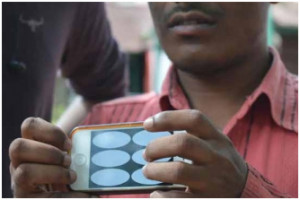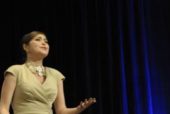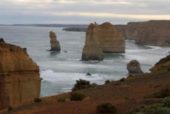Her Highness Sheikha Arwa Al Qassimi One of Primary Sponsors Bringing About a New Vision of Blindness
Published on: March 29, 2016

From apps to specialists, technology and workshops, there are a myriad of ways visually impaired people are partaking in photography these days.
If you thought that photography as an art was cut off for people without sight, or that you need to see to take photographs, you might be surprised to know that this is actually not the case.
In India and other places, the idea of “blind photography” is new, but we can dream that the idea will not seem so strange or different in the future, though the physical and technical attachments and apparatuses that can help blind photographers are either in short supply or do not yet exist. Instead, blind photographers rely on their sensual experiences, the orchestra of sound of a crowded street, the moisture in the air, the light of the moon, the chill of the wind, the help of a passerby. With more training and new innovations, hopefully the process will become easier for visually impaired photographers and then we will begin to see more such artists producing more art and at a more refined level.
Even though blind photography and exhibitions showcasing such work is not widespread, these are not new phenomena and there have been core groups of enthusiasts and exhibitions for years now. As time progresses, the hope is that they will become more popularized and appreciated by the public. One visually impaired photographer who has been at this for some time is Sonia Sobertas. In fact, it was after she lost her vision that she got into photography. Sobertas lets her other senses guide her in taking her photographs. When photographing people, she asks them to describe themselves to her, then has her assistant make adjustments to her equipment and lighting—sometimes involving flashlights or Christmas lights—in reaction to their skin tones, hair color, and other physical traits. This is how she crafts her photographs.
When blind photographers work, they incorporate the sounds and textures of what they are photographing in addition to their natural need to explore in unconventional ways, molding their style and technique in novel manners. They even utilize text-to-braille converters to help them make technical adjustments to their equipment when necessary. Other visually challenged artists have spoken of using 3D printers that produce a way for them to physically feel their photographs and also of online educational institutions like www.blindwithcameraschool.org. Apps like TiltShift and Camerabag are accessible for visually impaired users and help them edit their photos. Thus, there are a number of available tools for blind photographers, and these tools are expected to grow in number and quality over time.
Particularly in India, photography by the blind is still quite out of the ordinary but that is not discouraging for its enthusiasts. Sightsavers, active in India, is one example of an NGO that fights for the blind; it works to prevent and treat blindness and also fights for the visually impaired on the social, political, and accessibility fronts. It has organized with 53.4 million people, undertaken 36.2 million eye treatments, and saw to 4.9 million eye surgeries. The group organized an exhibition in New Delhi featuring photography by and of the visually impaired at the British Council during the International Day of Persons with Disabilities. The exhibition was part of a larger campaign titled “The Blind View,” and was also assisted by the efforts of a like-minded organization called the Beyond Sight Foundation. At the New Delhi event, one keynote speaker, Padma Shri Rai—one of India’s most iconic photographers (possible its most) in its history—remarked of the blind photographers: “I believe what they have captured is much purer than what others do because they are uncorrupted souls. Wohmannkiaankhon se dekhtehai. That innocence is what refines their talent.”
ParthoBhowmick, Founder, Beyond Sight Foundation, was also on hand to assist the blind artists during workshops he helped to sponsor: “We trained them to click pictures at a workshop that we had organised some months ago,” he noted. “Our supervisors were well-trained but we also registered the presence of some really talented participants, one of them being Bhavesh Patel, who is known for having done a photo-shoot with actress Katrina Kaif.”
In addition, famous photojournalist and photographer RN Mohanty—who is also the head of Sightsavsers’ Indian branch—was on hand, as was the Director Operations, British Council India, Gill Caldicott. They were especially appreciative of the support of Princess SheikhaArwa Al Qassimi, one of Sightsavers’ board members. The exhibit showcased roughly thirty photos centered around themes related to the experiences of the visually impaired and featured blind people as subjects, displaying them performing normal things like dancing and office work but also showing them facing the unique challenges presented by their impairment. One of the blind photographers was there to illuminate his technique and thinking behind his art.
Ketan Kothari, an visually impairedadvocate for the disabled, recently began photographing monuments. He uses volunteers, strangers, and his instinct in his artistic pursuits, but also hisiPhone and its automatic features. His explanation for his pursuits was simple: “Well, if the differently abled could be lawyers, singers, mountaineers, why not photographers as well?”
The event also featured musical performances by visually impaired musicians with the assistance of theHosla Charitable Trust, a fitting addition to a night of arts by, for, and of the blind.






